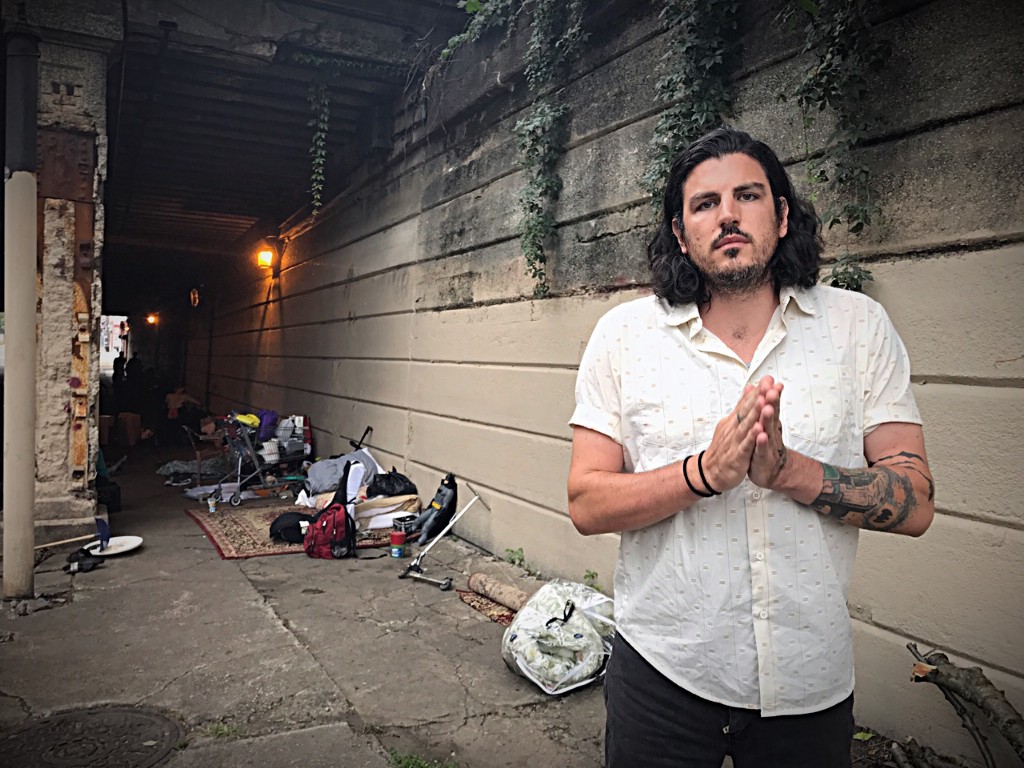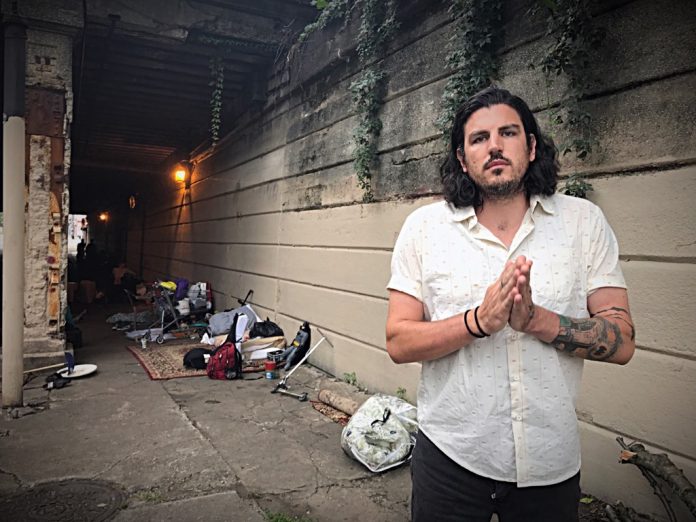Dan Martino, a Democratic candidate running for Pennsylvania’s 177th House district, doesn’t think of himself as a politician.

By Max Marin
Dan Martino visibly winces at the thought of being called a “politician.”
The 33-year-old Northeast Philly native rocks long black hair and tattoos, including one finger inked with a small skull and crossbones. He plays drums in local folk-punk band TJ Kong and the Atomic Bomb.
“I don’t own a suit,” he says.
But in recent years, Martino has become something of an activist in his River Wards neighborhood of Olde Richmond, where drug policy and public safety intertwine every day. He built a crime watch group. He organized an overdose awareness march last year, and is often cited in media reports about the area’s drug problem.
It’s that experience that has inexorably guided Martino into politics: Recently, he joined the pool of Democratic candidates gunning to replace longtime Republican Rep. John Taylor, who retires at the end of this term, in Pennsylvania’s 177th House district.
In a midterm primary otherwise filled with boilerplate Democratic platforms, Martino’s candidacy raises the question of whether the battle for the 177th seat could be a single-issue race. Could a strong approach to the opioid crisis and its attendant woes be a ticket to victory in the neighborhoods hit hardest?
“It’s becoming the biggest quality-of-life issue in the district,” Martino says. “The crime issues are tied into the drug problem, and the city’s poverty level fuels the drug trade.”
Through the Olde Richmond Civic Association, where he serves as secretary, Martino helped craft a Town Watch program to quell some of the crimes attributed to the area’s large addicted population. In the year since its inception, he says, the area has seen a 50 percent reduction in burglaries and a 30 percent drop in thefts.
But crime stats to the contrary, Martino, who makes his living as a graphic designer, isn’t exactly the law-and-order type.
“Without safe injection sites, you’re condemning me and my neighbors to a lifetime of cleaning up needles,” Martino says. “You’re condemning me and my neighbors to a lifetime of witnessing people shooting up.”
The heavily gerrymandered 177th district includes parts of Fishtown, Port Richmond and Mayfair, all of which have been hit particularly hard by the surge of opioid overdoses. The North Delaware and River Wards municipal planning regions — parts of which the district covers — had the two highest rates of fatal overdoses per capita in Philadelphia in 2016, according to the city’s Department of Public Health.
While top Philadelphia officials are jockeying to open the first supervised injection facility in the nation, the fate of the proposal is still very much uncertain, and community support will play a decisive role.
“Everyone wants to move it away from them, but just pushing the problem around doesn’t make anyone’s life better. People are talking about the homeless and addicted population moving northward from Kensington — guess what, that’s this district,” Martino said.
The self-styled outsider victories of Larry Krasner and Rebecca Rhynhart last year may lend confidence to a political unknown such as Martino, but district races in Philadelphia still operate under old provincial customs. Martino’s opponents have stronger ties to ward leaders and Democratic kingmakers. And while he may have some street activist credentials, he isn’t the only candidate in the 177th to put forth a drug-conscious platform.
Maggie Borski, a 24-year-old third-year Temple Law student — and daughter of former U.S. Rep. Bob Borski — ranked the crisis in her “top three” campaign issues. On her website, she calls for more drug education, syringe exchange programs and access to overdose-reversing naloxone. Pressed by a reporter, Borski did not have a stance on supervised injection facilities.
“It’s probably something I’d have to research more,” she said. ”
Also in her favor: Borski has touted that she’s the only declared female candidate in a race that has rumored to have up to a dozen candidates. (Not all of them have declared.) She has also wooed the support of former Gov. Ed Rendell, among other influential politicians.
Union plasterer Sean Kilkenny has the support of the city’s building trades unions, which are helping him build a campaign war chest. (Kilkenny did not return a request for comment on the opioid and overdose crisis.)
Another candidate, Sean Patrick Wayland, who served eight years in the U.S. Army Reserve, lists “opioid epidemic” on his platform issues, though no specifics are offered.
Joe Hohenstein, who took about 45 percent of the vote against Taylor in 2016, will also return.
“I have seen open air deals while door knocking in my neighborhoods and I know that residents are scared and many feel trapped in their homes,” Hohenstein said. “We need to find ways to provide treatment and assure surrounding communities of their security.”
And still more may jump in. Others include Tom Forkin, an aide to state Rep. Mike Driscoll; Sean K. McMonagle, an aide to Councilman Mark Squilla; and Harry Enggasser, who is a ward leader, aide to U.S. Rep. Bob Brady, two-time challenger to Taylor and president of the Bridesburg Civic Association. Former Councilman and ward leader Dan Savage, once rumored to be running with the Democratic City Committee’s backing, is sitting out the race and backing Hohenstein.
As for Martino, he’s not expecting much in the way of big-name support.
“There are establishment candidates who are going to soak up all of the endorsements,” Martino said. “I didn’t expect to have the Democratic machine in Philadelphia come and lay their hands on me.” ••





